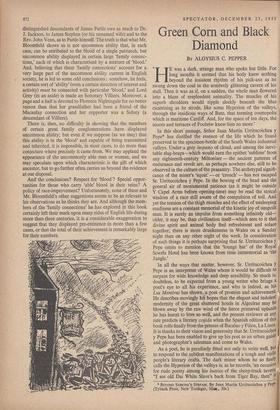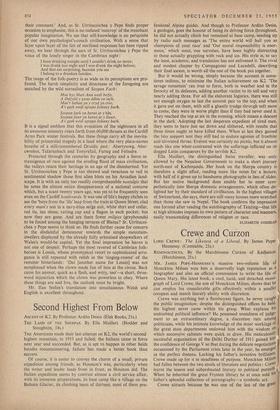Green Corn and Black Diamond
By ALOYSIUS C. PEPPER HE was a dark, strange man who spoke but little. For long months it seemed that his body knew nothing beyond the insistent rhythm of his pick-axe as he swung down the coal in the sombrely glittering cavern of his stall. Then it was as if, on a sudden, the whole man flowered into a blaze of resplendent animality. The muscles of his superb shoulders would ripple sleekly beneath the blue cicatrising as he strode, like some Hyperion of the valleys, through the insidious ways of Bute, that teeming cosmopolis which is maritime Cardiff. And, for the space of ten days, the moors and terraces of Fochriw knew him no more.'
In this short passage, Setior Juan Martin Urritucoichea y Pepe* has distilled the essence of the life which he found preserved in the specimen-bottle of the South Wales industrial valleys. Under a grey impasto of cloud, and among the inevi- table slag-heaps—which would earn the epithet `sublime' from any eighteenth-century Miltoniser — the ancient patterns of endurance and revolt are, as perhaps nowhere else, still to be observed in the culture of the peasantry. The archetypal signifi- cance of the. miner's 'squat' — or 'crouch' — has not escaped Sr. Urritucoichea y Pepe. In the bowing of the head and the general air of monumental patience (as it might be outside Y Capel Arms before opening-time) may be read the stoical wisdom of a race still aware of the compulsion of toil. And yet the tension of the thigh muscles and the effect of unsleeping readiness are a constant memorial of the kinetic joy of unspoilt man. It is surely an impulse from something infinitely old older, it may be, than civilisation itself—which sees to it that divine spirit and animal body find refreshment and solace together; there is more drunkenness in Wales on a Sunday night than on any other night of the week. In consideration of such things it is perhaps surprising that Sr. Urritucoichea y Pepe omits to mention that the `lounge bar' of the Royal Scwrfa Hotel has been known from time immemorial as 'the Jungle.'
In all the ways that matter, however, Sr. Urritucoichea y Pepe is an interpreter of Wales whom it would be difficult to surpass for wide knowledge and deep sensibility. So much is, doubtless, to be expected from a young writer who brings a poet's eye to all his experience, and who is indeed, as his Las Mentiras has shown,, a, poet of promise and achievement 1 He describes movingly his hopes that the elegant and indolent modernity of the great shuttered hotels in Algeciras may be blown away by the raw wind of the fierce primmval uplands he has learnt to love so well, and the present reviewer at anY rate predicts a literary cogida when the Spanish edition of this book rolls finally from the presses of Bacalao y Filios, La Linea. It is thanks to their vision and generosity that Sr. Urritucoichea y Pepe has been enabled to give up his post as an urban guide ,, and phOtographer's salesman and come to Wales.
As a poet, he is peculiarly fitted not only to write well, but to respond to the subtlest manifestations of a tough and virile people's literary crafts. The dark miner whom he so finely calls the Hyperion of the valleys is, as he records, `an occasion for rude poetry among his butties of the sheep-track tavern' , "I see old Dai White Slave's back from Tiger Bay, then" is f * BEYOND SABRINA'S STREAM. By Juan Martin Urritucoichea y PePo' (Tybach Press, New Tredcgar, Mos., 30s.)
their comment.' And, as Sr. Urritucoichea y Pepe finds proper occasion to emphasise, this is no isolated 'outcrop' of the trenchant popular imagination. We'see that self-knowledge is no perquisite of our Own psychologist's-couch civilisation. With a sense that layer upon layer of the lint of sterilised responses has been ripped away, we hear through the ears of Sr. Urritucoichea y Pepe the voice of the lonely singer in the Cambrian night :
I been drinking tonight until I couldn't drink no more; I was drunk last night and 1 was drunk the night before; And that ent surprising, because you see
I belong to a drunken familee.
The range of the folk-poetry is as wide as its perceptions are pro-
found. The harsh simplicity and directness of the foregoing are matched by the wild surrealism of Sospan Fach:
Mae bys Mari Ann wedi brifo, A Dafydd y gwas ddim yn iach, Mae'r baban yn y cryd yn trio, A'r gath wedi sgrapo Johnny bach.
Sospan Each yn berwi ar yctitn, Sospan fawr yn berwi ar y llawr, A'r gath wedi sgrapo Johnny bach.
It is a signal emblem that this evocation of the nightmare in all
its awesome intensity roars forth from 60,000 throats at the Cardiff Arms Park winter festivals. But these things carry all the inevita- bility of primordial tragedy in a land where the very place-names breathe of a still-remembered Druidic past : Abertysswg, Aber- cwmboi, Tafarnabach and Tonyrefail, Farteg and Felindre. Protected through the centuries by geography and a fierce in- transigence of race against the eroding flood of mass civilisation, the valleys retain their heritage in an age of the disinherited. Yet Sr. Urritucoichea y Pepe is too shrewd and veracious to veil in sentimental shadow those first alien blots on his Arcadian land-
scape. It is with an only too readily comprehensible nostalgie that he notes the almost entire disappearance of a national costume which, but a scant twenty years ago, was yet to be frequently seen even on the Cardiff boulevards. It was one of life's happy clichés to see the 'boys from the 'ills' leap from the train at Queen Street, clad every mam's son in a navy-blue serge suit, white shirt and collar, red tie, tan shoes, ratting cap and a flagon in each pocket; but now they are gone. And are there fewer milgies (greyhounds)
to be found among the hanging terraces of Blaina? Sr. Urritucoi- chea y Pepe seems to think so. He finds further cause for concern in the disdainful demeanour towards the simple mountain- dwellers displayed by the already fully urbanised shopwalkers of Wales's would-be capital. Yet the final. impression he leaves is not one of despair. Perhaps the most revered of Cambrian folk- heroes is Lossin, whose prototypical retort to sophisticated arro- gance is still repeated with relish in the 'singing-rooms' of the remoter hinterlands: 'Dal [another name for Lossin] was not nonplussed when the clown made fun of him at the circus. Back came his answer, quick as a flash, and witty, too'—a short, three- word injunction which the clown was powerless to obey. Where these things are and live, the outlook must be bright.
Mr. lfan Stefen's translation into simultaneous Welsh and English is excellent throughout.



































 Previous page
Previous page